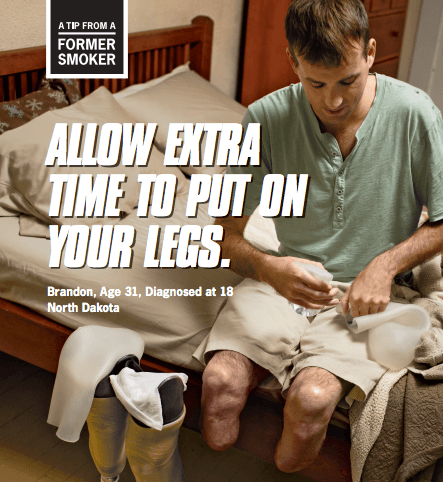VIDEO: CDC launches graphic anti-smoking ad campaign
The CDC is launching a new, graphic anti-smoking ad campaign trying to shock smokers into quitting. (Photo from the CDC.)
The federal government launched a $54 million anti-smoking campaign Thursday — an effort to shock people into quitting smoking.
The multimedia ad campaign, including ads on TV, in print, on radio and using billboards, shows people whose smoking resulted in heart surgery, a tracheotomy, lost limbs or paralysis.
“It began with my big toe, that was the first amputation I have,” one of the ad’s central subjects said. “My finger started to go piece by piece.”
The ad ultimately shows the woman’s finger as stubs. California, New York and other states have tried this sort of campaign to get people to stop smoking — but this is the first federal effort.
Danny McGoldrick, vice president at Campaign for Tobacco Free Kids, called this a major effort for the federal government.
“We lose 400,000 Americans every year to tobacco use,” McGoldrick said. “This is a proven approach to reducing that horrible number.”
McGoldrick said studies have shown that almost any mass media campaign reduces smoking in kids and adults — but this type of campaign, “an emotionally resonant campaign” depicting real life have an impact on encouraging people to try and quit but also discouraging kids from starting.
Massachusetts tried a similar campaign in the 1990s and state officials say it drove down cigarette sales by 45 percent. But there are signs that these campaigns may be losing their luster; the surgeon general reported that declines in cigarette and smokeless tobacco use have greatly slowed.
McGoldrick said that’s attributable to state decisions to stop funding quit smoking campaigns in the wake of the recession and related government budget crisis.
“Our states have cut 36 percent — over $300 million — from tobacco prevention campaigns, over the last four years,” he said. “The reason our progress has slowed is we’re not doing the things that we know reduce tobacco use among kids and adults.”
That contradicts, he said, with the smoking industry which spends, on average, $1 million per hour to advertise its products. The $54 million campaign will be spread over 12 weeks.
